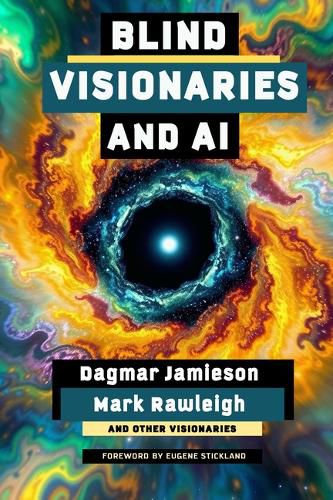Readings Newsletter
Become a Readings Member to make your shopping experience even easier.
Sign in or sign up for free!
You’re not far away from qualifying for FREE standard shipping within Australia
You’ve qualified for FREE standard shipping within Australia
The cart is loading…






Blind Visionaries and AI: Seeing Differently is an in-depth exploration of how individuals with diverse visual impairments leverage technology--and especially AI--to reimagine their perceptions of the world. Central authors Dagmar Jamieson, who lost her sight due to cone-rod dystrophy, and Mark Rawleigh, diagnosed with Retinitis Pigmentosa, provide foundational narratives informed by their personal journeys, establishing context for insightful chapters and interviews from a diverse group of accomplished experts, each with unique visual impairments.
Structured as a collaborative volume, the book begins with a foreword by playwright Eugene Stickland, who discusses his experiences living with prosopagnosia (face blindness). This is followed by chapters from pioneering professionals, including Ashley King, a legally blind actor and playwright who advocates for accessibility and inclusive representation in the arts. Jonathan Sieswerda, whose congenital visual impairment drives his exploration of technology's dual potential to empower and isolate, also contributes. Dr. John-Ross Rizzo, alongside colleague Dr. Giles Hamilton-Fletcher, shares groundbreaking research on Choroideremia and sensory substitution, while Jason Crawford, a legally blind multi-disciplinary artist, explores how AI has become his creative partner--enhancing his work in music, acting, and writing while preserving the authenticity of his artistic voice.
Additional insights come through interviews with Sam Seavey, creator of The Blind Life YouTube channel, who shares how his experience with Stargardt's disease led to a leading role in assistive tech education; Maria Ramirez, a SmartLife Coach at CNIB, who discusses her journey with rod-cone dystrophy and how AI-powered wearables like Envision Glasses are reshaping independence; and artist Julian Hobson, who reflects on colour vision deficiency and his unique blend of medical physics, metaphysics, and art. His vision is also captured in the book's striking cover design. Together, their perspectives expand the narrative, showing how personal experience and emerging technology intersect to redefine what it means to see differently.
These compelling personal narratives and interviews illuminate technology's transformative potential for promoting independence, creativity, and professional advancement while critically examining both its capabilities and limitations. Blind Visionaries and AI offers readers practical insights into implementing and advancing assistive technologies and AI, highlighting their potential to foster greater inclusivity and societal engagement.
$9.00 standard shipping within Australia
FREE standard shipping within Australia for orders over $100.00
Express & International shipping calculated at checkout
Stock availability can be subject to change without notice. We recommend calling the shop or contacting our online team to check availability of low stock items. Please see our Shopping Online page for more details.
Blind Visionaries and AI: Seeing Differently is an in-depth exploration of how individuals with diverse visual impairments leverage technology--and especially AI--to reimagine their perceptions of the world. Central authors Dagmar Jamieson, who lost her sight due to cone-rod dystrophy, and Mark Rawleigh, diagnosed with Retinitis Pigmentosa, provide foundational narratives informed by their personal journeys, establishing context for insightful chapters and interviews from a diverse group of accomplished experts, each with unique visual impairments.
Structured as a collaborative volume, the book begins with a foreword by playwright Eugene Stickland, who discusses his experiences living with prosopagnosia (face blindness). This is followed by chapters from pioneering professionals, including Ashley King, a legally blind actor and playwright who advocates for accessibility and inclusive representation in the arts. Jonathan Sieswerda, whose congenital visual impairment drives his exploration of technology's dual potential to empower and isolate, also contributes. Dr. John-Ross Rizzo, alongside colleague Dr. Giles Hamilton-Fletcher, shares groundbreaking research on Choroideremia and sensory substitution, while Jason Crawford, a legally blind multi-disciplinary artist, explores how AI has become his creative partner--enhancing his work in music, acting, and writing while preserving the authenticity of his artistic voice.
Additional insights come through interviews with Sam Seavey, creator of The Blind Life YouTube channel, who shares how his experience with Stargardt's disease led to a leading role in assistive tech education; Maria Ramirez, a SmartLife Coach at CNIB, who discusses her journey with rod-cone dystrophy and how AI-powered wearables like Envision Glasses are reshaping independence; and artist Julian Hobson, who reflects on colour vision deficiency and his unique blend of medical physics, metaphysics, and art. His vision is also captured in the book's striking cover design. Together, their perspectives expand the narrative, showing how personal experience and emerging technology intersect to redefine what it means to see differently.
These compelling personal narratives and interviews illuminate technology's transformative potential for promoting independence, creativity, and professional advancement while critically examining both its capabilities and limitations. Blind Visionaries and AI offers readers practical insights into implementing and advancing assistive technologies and AI, highlighting their potential to foster greater inclusivity and societal engagement.